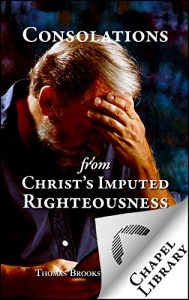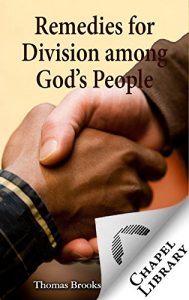Another quality eBook from Chapel Library. Consolations from Christ’s Imputed Righteousness wonderfully combines devotional encouragement and doctrinal truth. It faithfully declares the heart of the Gospel for both Christians and non-Christians alike.
Thomas Brooks (1608-1680) was born into a Puritan family and became a Nonconformist preacher. He studied at Cambridge, became an advocate of the Congregational way, and served as a chaplain in the English Civil War. In 1648 he accepted the rectory of St. Margaret’s in London and on several occasions preached before Parliament. Like many others, Brooks was ejected by the Act of Uniformity in 1662, and remained in London as a Nonconformist preacher. He labored in comfort and relief during the Great Plague and Great Fire, and in 1672 was granted a license to preach in Lime Street. Brooks wrote over a dozen books, which include Precious Remedies against Satan’s Devices and The Mute Christian under the Smarting Rod. His writings are always Christ-centered, filled with Scripture, and usually devotional in character. Charles Spurgeon once told his students, “His style is clear and full; he never so exceeds in illustration as to lose sight of his doctrine. His floods of metaphor never drown his meaning, but float it upon their surface. If you have never read his works I almost envy you the joy of entering for the first time.”
Thomas Brooks (1608-1680) was born into a Puritan family and became a Nonconformist preacher. He studied at Cambridge, became an advocate of the Congregational way, and served as a chaplain in the English Civil War. In 1648 he accepted the rectory of St. Margaret’s in London and on several occasions preached before Parliament. Like many others, Brooks was ejected by the Act of Uniformity in 1662, and remained in London as a Nonconformist preacher. He labored in comfort and relief during the Great Plague and Great Fire, and in 1672 was granted a license to preach in Lime Street. Brooks wrote over a dozen books, which include Precious Remedies against Satan’s Devices and The Mute Christian under the Smarting Rod. His writings are always Christ-centered, filled with Scripture, and usually devotional in character. Charles Spurgeon once told his students, “His style is clear and full; he never so exceeds in illustration as to lose sight of his doctrine. His floods of metaphor never drown his meaning, but float it upon their surface. If you have never read his works I almost envy you the joy of entering for the first time.”










